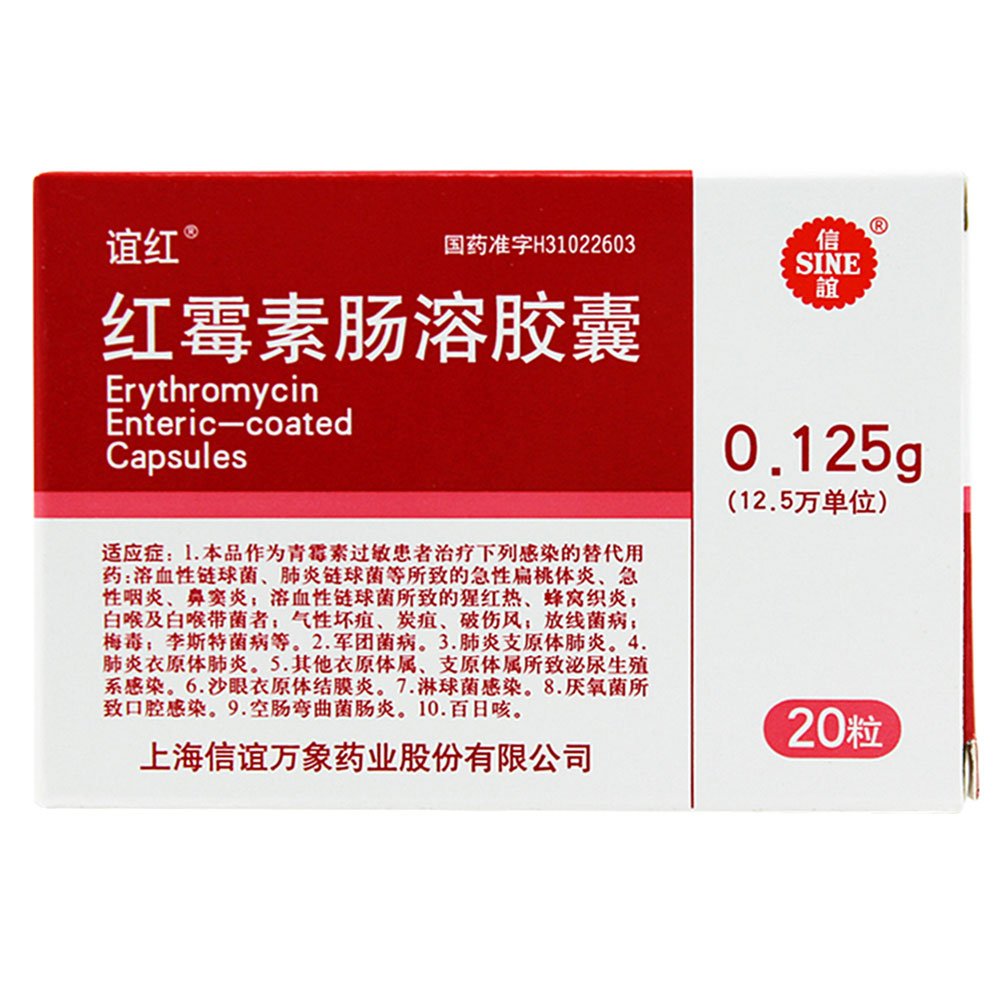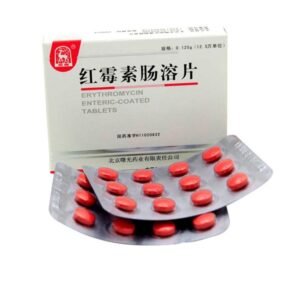Erythromycin
Effects and efficacy: Acute tonsillitis, acute pharyngitis, sinusitis, scarlet fever, cellulitis, diphtheria, gas gangrene, anthrax, tetanus, actinomycosis, syphilis, listeriosis, etc. for those who are allergic to penicillin. Legionnaires’ disease, pneumonia, urogenital system infection, conjunctivitis, Neisseria gonorrhoeae infection, oral infection, Campylobacter jejuni enteritis, whooping cough, erythrasma, intestinal amebiasis, mononucleosis, mild to moderate skin and soft tissue infection. Urinary tract infection, cervical infection, rectal infection in adults who are contraindicated or intolerant to tetracycline. Prevention of endocarditis during dental surgery or upper respiratory tract surgery in patients with valvular heart disease who are allergic to penicillin. Erythromycin ointment is used to treat suppurative skin diseases (such as impetigo), small or mild (Ⅰ° or Ⅱ°) burns, ulcer surface infection, and acne vulgaris. Erythromycin eye ointment is used to treat trachoma, conjunctivitis, blepharitis, and external eye infection. Dosage and Administration:
Oral administration for adults: For general use, the recommended dose is 250 mg once every 6 hours; or 500 mg once every 12 hours. Depending on the severity of the condition, the dose can be increased to 4 g per day. When the daily dose exceeds 1 g, it is not recommended to take it twice a day. If it is a streptococcal infection, the course of treatment is at least 10 days; for continuous prevention of recurrence of streptococcal infection in patients with rheumatic heart disease, take 250 mg once, twice a day. Please follow the doctor’s advice for details. Rectal administration: It is generally appropriate to insert the suppository 2 cm deep into the anus, 200 mg once, twice a day. Please follow the doctor’s advice for details. Legionnaires’ disease: Oral administration, 1-4 g per day, divided into doses. Please follow the doctor’s advice for details. Urinary tract infection during pregnancy: Oral administration, the recommended dose is 500 mg once, 4 times a day, taken on an empty stomach, for 7 consecutive days. For patients who cannot tolerate this dose, the dose can be reduced to 250 mg once, 4 times a day, for 14 consecutive days. Please follow the doctor’s advice for details. Intestinal amebiasis: Oral administration, 250 mg once, once every 6 hours, for 10-14 days. Please follow the doctor’s advice for details. Urinary tract infection, cervical infection, rectal infection in adults with contraindications or intolerance to tetracycline: Oral administration, 500 mg once, 4 times a day, for 7 days. Please follow the doctor’s advice for details. Prevention of endocarditis during dental surgery or upper respiratory tract surgery in patients with valvular heart disease who are allergic to penicillin: Oral administration, 1g 1 hour before surgery, and 500 mg 6 hours after surgery. Please follow the doctor’s advice for details. Purulent skin diseases (such as impetigo), small or mild (Ⅰ° or shallow Ⅱ°) burns, ulcer surface infections, acne vulgaris: Topical application, apply an appropriate amount to the affected area, twice a day. Please follow the doctor’s advice for details. Trachoma, conjunctivitis, blepharitis, external eye infections: Ocular administration, apply to the inside of the eyelids, 2-3 times a day, the last application should be before bedtime. Please follow the doctor’s advice for details. Special Populations Patients with renal insufficiency: Patients with mild to moderate renal impairment usually do not need to reduce the dose, and patients with severe renal impairment should reduce the dose appropriately. No additional administration is required after hemodialysis or peritoneal dialysis. Please follow the doctor’s advice for details. Patients with hepatic insufficiency: Patients with liver disease should reduce the dose appropriately. Please follow the doctor’s advice for details. Oral administration for children: General usage, 30-50mg/kg per day, taken in 2 times, the dose can be doubled for severe infection. Please follow the doctor’s advice for details. Rectal administration: General usage, 20-30mg/kg per day. Please follow the doctor’s advice for details. Whooping cough in children: Oral administration, the recommended dose is 40-50mg/kg per day, taken in 3 times, for 5-14 days. Please follow the doctor’s advice for details. Intestinal amebiasis in children: Oral administration, 30-50mg/kg per day, taken in divided doses, for 10-14 days. Please follow the doctor’s advice for details. Prevention of endocarditis during dental surgery or upper respiratory tract infection in children with valvular heart disease who are allergic to penicillin: Oral administration, take 20mg/kg 1 hour before surgery, and take 10mg/kg 6 hours after surgery. Please follow the doctor’s advice for details. Children’s suppurative skin diseases (such as impetigo), small or mild (Ⅰ° or shallow Ⅱ°) burns, ulcer surface infections, acne vulgaris: Topical use, usage and dosage are the same as adults; trachoma, colitis, blepharitis, external eye infections, administration through the eyes, usage and dosage are the same as adults. Please follow the doctor’s advice for details.
Drug contraindications:
Allergy to this product is prohibited. Use with caution during pregnancy. Use with caution during lactation. Use with caution in liver and kidney dysfunction.
Related dosage forms:
Ointment, eye ointment, suppository, enteric-coated tablets, enteric-coated capsules, powder injection
Share:
Products
Our offers
Health Classification
Let us work together to protect precious health






























